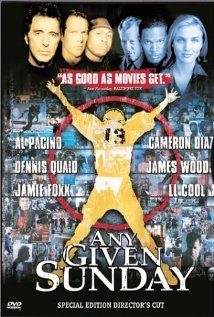“Take No Prisoners”

| None | Light | Moderate | Heavy | |
|---|---|---|---|---|
| Language | ||||
| Violence | ||||
| Sex | ||||
| Nudity |
What You Need To Know:
The sentiments of ANY GIVEN SUNDAY clearly side with Coach Tony, who firmly believes that the game of professional football “has got to be about something more than winning.” This philosophy is what leads him to clash with the owner and with young quarterback Willie Beaman (Foxx). It also gives a moral center to this uneven movie, which explores the themes of tradition, change and the conflict between the individual and the team. On the extremely negative side, ANY GIVEN SUNDAY has plenty of strong foul language. Although the sex scenes are tame for an R-rated movie, the director breaks some taboos in a couple shots of full nudity by including a brief shot of genitalia.
Content:
(HH, PaPa, B, LLL, VVV, S, NNN, AA, DD, M) Humanist worldview with pagan, moral & religious elements, including one team prayer; 233 mostly strong obscenities, 32 mostly strong profanities, obscene gestures, & some crude sexual talk; extensive football violence; scenes of implied fornication & prostitution; upper & rear male & female nudity, plus medium shots of male & female genitalia; alcohol use & abuse; smoking & drug abuse; and, miscellaneous immorality such as neglecting family for work, black football player uses race card & scenes of vomiting.
More Detail:
Stone is so intent on putting viewers into the action that he forgets the basic rule of shooting action – viewers need to be given a visual context of where the players are in relation to one another if they are to make sense of what is really going on in the story. Thus, a jumble of close-up images may be good if you’re trying to merely show the chaos in the trenches, but it’s a lousy way of becoming emotionally involved in the characters and their particular situation. Even an editing whiz like Alfred Hitchcock never violates this rule. He always manages to keep viewers engaged in the plight of his characters, no matter how fast and furious the images may come.
In ANY GIVEN SUNDAY, Al Pacino plays a gruff, old-fashioned football coach who must find a way to reign in his new showboating football star to get his team in shape for the playoffs. Jamie Foxx plays the young quarterback who helps turn around the team. Dennis Quaid plays the old quarterback who gets one more shot at glory. Finally, Cameron Diaz plays the young owner of the team, who locks horns with Pacino’s Coach Tony D’Amato.
The sentiments of ANY GIVEN SUNDAY clearly side with Coach Tony, who firmly believes that the game of professional football “has got to be about something more than winning.” This philosophy is what leads him to clash with the owner and with young quarterback Willie Beaman (Foxx). It also gives a moral center to the movie, which also explores the themes of tradition, change and the conflict between the individual and the team ego. The movie not only shows conflict on the playing field but also conflict in the boardroom. In the end, Coach Tony plays hardball with Cameron Diaz’s young owner character, jolting her with a major news announcement during the movie’s end credits. This scene undercuts Coach Tony’s moral integrity in the rest of the movie, as does a scene where a young prostitute visits him. There’s pleasure in winning after all, it seems.
On the extremely negative side, ANY GIVEN SUNDAY has plenty of strong foul language. Although the sex scenes are remarkably tame for an R-rated movie by Oliver Stone, the director breaks some taboos in a couple shots of full nudity by including a brief, gratuitous shot of female genitalia. The titillating shots drew some cynical chuckles in the screening audience. Also extremely disappointing is the movie’s failure to show all the Christian athletes who play an important role in professional football.
Oliver Stone remains, at heart, a guerrilla filmmaker. His style is a take-no-prisoners approach. It ultimately indicates a humanist worldview. This kind of visceral filmmaking will be easily forgotten, because the cinematic hammering eventually tends to dull the senses.



